Looking to pinpoint the real value of a travel trailer? Whether you’re stepping into the market to buy or sell, understanding travel trailer values is crucial for a fair deal.
You’ve landed in the right spot.
This guide dives deep into the essentials of determining the realistic value of travel trailers. We’ll demystify NADA Guides, explaining how this resource helps establish both wholesale and retail prices. We’ll also clarify common misconceptions around Kelley Blue Book in the RV context and address frequently asked questions from travel trailer enthusiasts and sellers alike.
Plus, we’ll point you towards a rapidly growing online platform perfect for buying and selling travel trailers.
Who Determines Travel Trailer Value?
Similar to the automotive world, the travel trailer industry relies on specific tools to assist dealers and individuals in calculating the value of used recreational vehicles. These tools are vital for accurate travel trailer valuations, taking into account various factors and current market dynamics. While the valuation process shares similarities with cars, it’s important to note that the RV and travel trailer industry doesn’t utilize a “blue book” or “book value” in the same way as the Kelley Blue Book for cars.
Instead, the industry standard for travel trailer values is NADA Guides*. This guide serves as the primary valuation tool for travel trailers and other recreational vehicles.
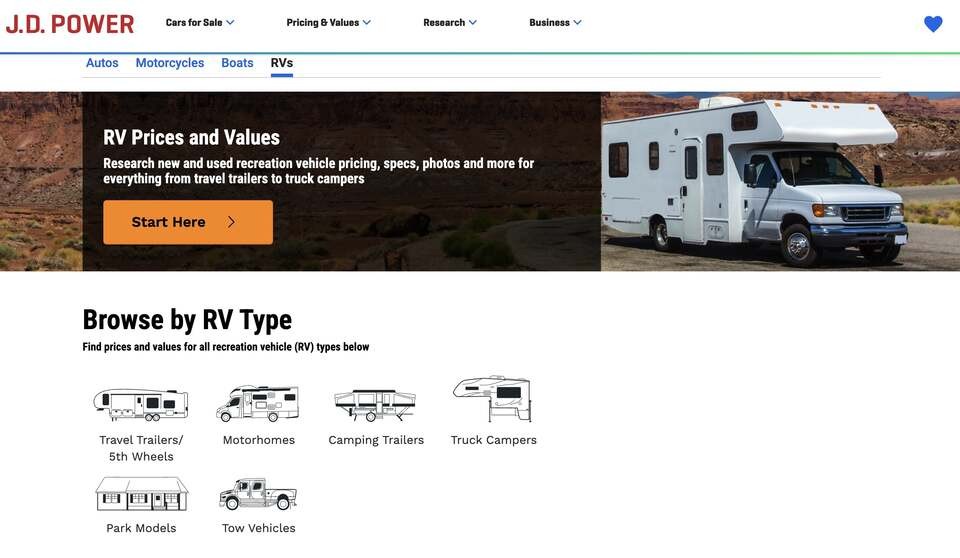 J.D. Power NADA Guides for RVs valuation tool
J.D. Power NADA Guides for RVs valuation tool
In 2015, J.D. Power took ownership of the used car guide from the National Automobile Dealers Association. J.D. Power’s NADA Guides are now the leading valuation resource for recreational vehicles, boats, motorcycles, and more.
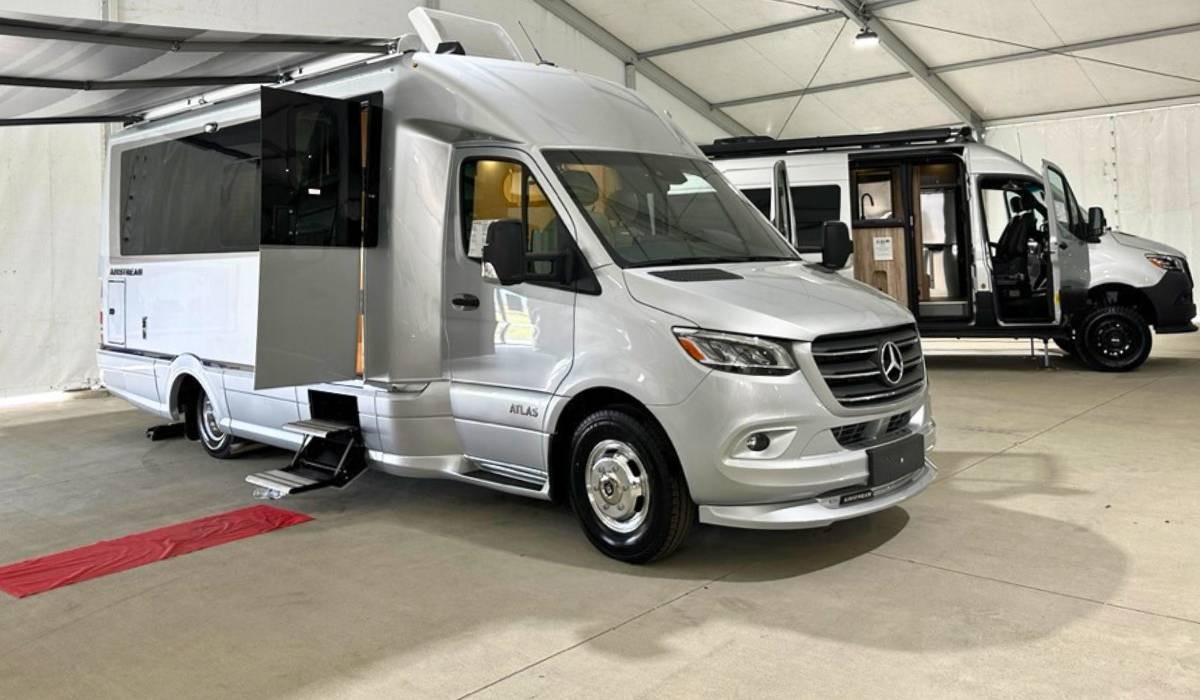 A travel trailer for sale indicating the importance of understanding its value
A travel trailer for sale indicating the importance of understanding its value
How NADA Guides Calculates Travel Trailer Values
NADA Guides employs a comprehensive approach, using nationwide data collected over time to establish a base value for travel trailers. This is a reference point for both consumers and dealers, and it incorporates several key elements:
- Comparable Listings: NADA analyzes recent sales prices of travel trailers that are the same or very similar in make, model, and year. This real-world sales data provides a strong benchmark.
- Depreciation Analysis: Depreciation is a significant factor. NADA uses depreciation charts and historical data to estimate value loss over time. Age and mileage are often key determinants in depreciation calculations for travel trailers.
- Factory Options and Features: Optional equipment and upgraded features installed by the manufacturer can increase a travel trailer’s value. It’s important to remember that NADA values factory-installed equipment, not necessarily aftermarket upgrades or renovations.
- Market Demand and Trends: The value of a travel trailer can fluctuate with market conditions. Seasonal demand, the release of new models, evolving trends in travel, and general economic factors all play a role in influencing prices.
- Condition and Maintenance History: The overall condition of a travel trailer is a major factor in its valuation. Evidence of regular maintenance and careful upkeep can positively impact its assessed value.
- Industry Pricing Insights: NADA incorporates pricing estimates from various industry sources, including dealers, manufacturers, and auction data, providing a well-rounded perspective on travel trailer values.
The NADA travel trailer value, derived from these factors, is essential for establishing both wholesale and retail prices. However, it’s worth noting that NADA valuations, like any guide, may have limitations in rapidly changing or niche market scenarios.
It’s important to understand that NADA Guides for consumers and dealers differ. Dealers have access to additional pricing data not publicly available, such as wholesale and auction prices, which gives them a more complete picture of travel trailer market values.
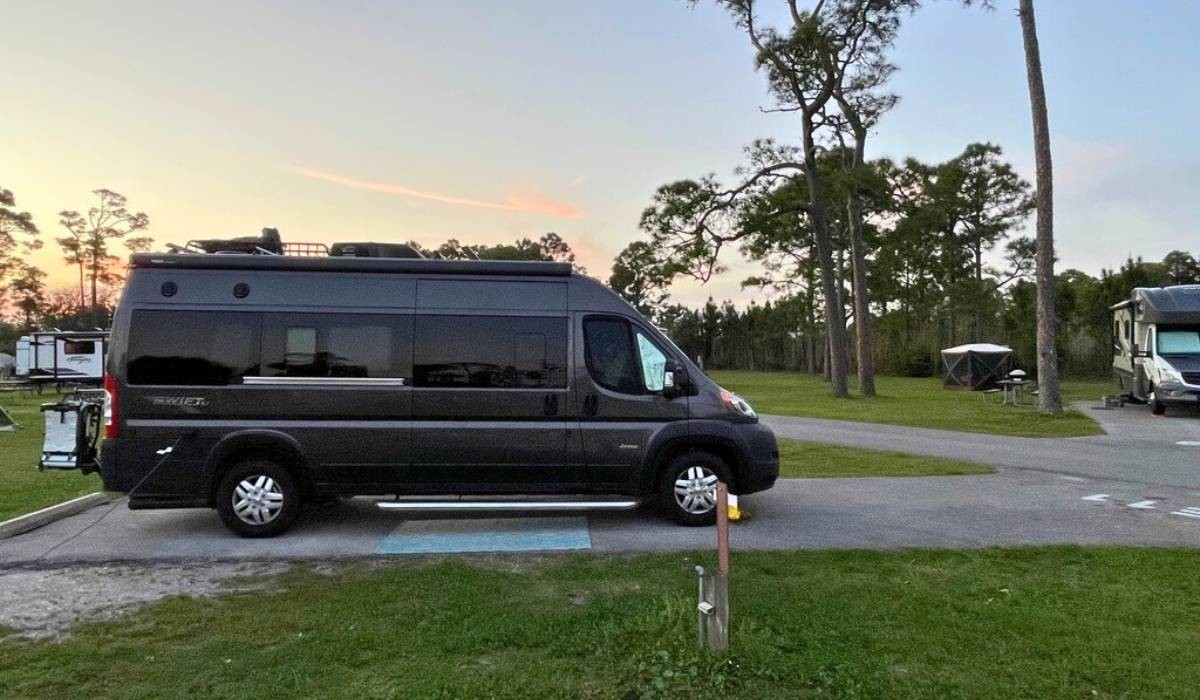 A modern Jayco Swift travel trailer showcasing different models within a brand
A modern Jayco Swift travel trailer showcasing different models within a brand
Determining the Value of Your Travel Trailer
Ready to find out what your travel trailer is worth? The process is straightforward when you have your travel trailer’s details at hand. Knowing the specific model and features of your travel trailer is essential for an accurate valuation.
Unsure where to find your travel trailer’s specifications? Consult your owner’s manual or the manufacturer’s website for detailed information.
- Go to the J.D. Power NADA Guides for RVs website.
- Select “Travel Trailer” as the RV type you want to research.
- Begin your valuation by entering the year, make, and model of your travel trailer. For the most precise results, specify the exact floor plan.
- Enter your zip code (or indicate if you’re searching from outside the U.S.).
- Choose your search method. You can search using the base price or manually input specifications like mileage (if applicable) and optional features.
NADA Guides Example for Travel Trailers
Let’s look at an example using a 2022 Jayco Jay Flight SLX 8 264BH travel trailer to illustrate both search methods and their outcomes. In most cases, both approaches will yield similar results, but the base price search is often quicker as it requires less manual data entry.
Base price search example:
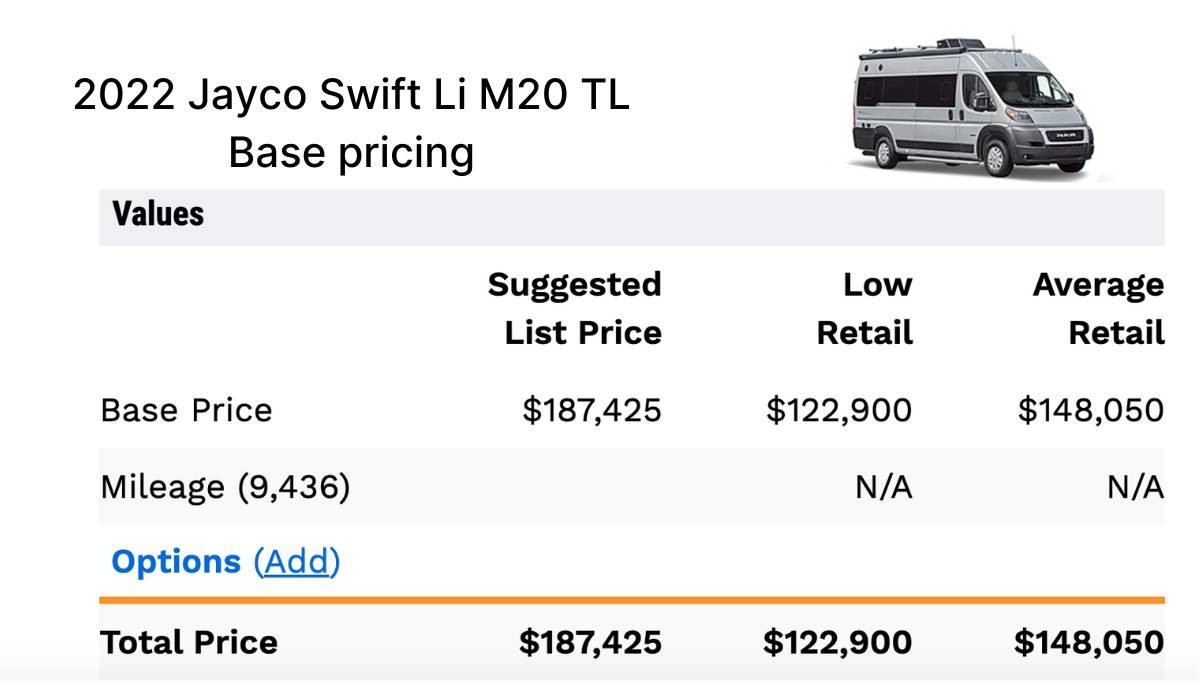 NADA Guides base price search example for travel trailer value
NADA Guides base price search example for travel trailer value
Manual entry search example:
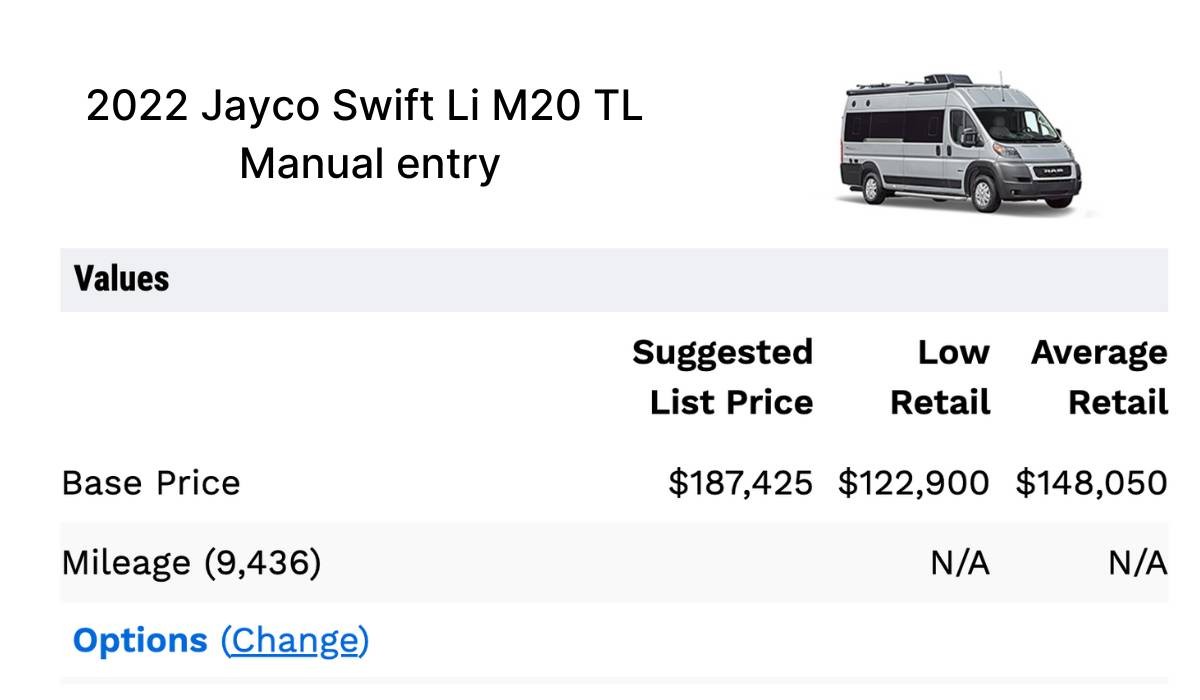 NADA Guides manual entry search example for travel trailer value
NADA Guides manual entry search example for travel trailer value
Understanding NADA Guide Value Categories
After performing your search, you’ll see base price values for “Suggested List,” “Low Retail,” and “Average Retail” prices for your travel trailer.
Keep in mind that NADA Guides doesn’t use Kelley Blue Book’s terminology like private party value, dealer trade, and retail value. However, to bridge the gap for those familiar with these terms, we’ll clarify the NADA Guide equivalents where applicable.
Understanding travel trailer resale values is key. It helps you grasp how travel trailers hold their value over time, accounting for depreciation, and allows you to compare the resale value of different travel trailer types.
Suggested List Price
The Suggested List Price is akin to the MSRP (Manufacturer’s Suggested Retail Price) you see on new passenger vehicles. This is the price you’d generally expect to pay for a brand-new travel trailer when purchasing from a dealership. The Suggested List Price serves as an initial point for negotiation. Typically, buyers pay less than this unless demand significantly outweighs supply in the market.
Low Retail Price (Dealer Trade-In Value)
The Low Retail Price represents what you might expect to pay at a dealership for a used travel trailer that exhibits higher mileage, more than average wear and tear, or is in below-average condition. It’s also the highest price most dealers are likely to offer if you’re trading in your travel trailer.
Average Retail Price (Retail Value)
The Average Retail Price is what you can anticipate paying for a used travel trailer when buying from a dealership. It’s a reasonable starting point for price negotiations with a dealer within your local area.
The Average Retail Price for the same travel trailer can vary between dealerships. This is because the condition of individual used travel trailers and the dealer’s specific NADA calculation can differ.
 Signing documents at a dealership potentially for a travel trailer purchase or sale
Signing documents at a dealership potentially for a travel trailer purchase or sale
Other Important Travel Trailer Values
Private Party Value
NADA Guides does not officially use the term “private party value.” Kelley Blue Book uses this term to indicate a starting point for price discussions between private sellers and buyers of used vehicles. For travel trailers, while NADA doesn’t explicitly use this term, understanding the Average Retail Price can provide a good reference point for private sales, potentially aiming for a price between the Low and Average Retail values depending on condition and market factors.
Wholesale Value
Wholesale value is the price dealers receive when they sell a travel trailer at auction. It also represents the cash offer you’re likely to get if a dealer buys your travel trailer outright.
NADA wholesale pricing is not accessible to the public. To estimate your travel trailer’s wholesale value, you can take the Low Retail Price and deduct approximately 10% to 20%.
Depreciation of Travel Trailers
Like cars and trucks, travel trailers begin to depreciate in value as soon as they are purchased. In the first year, a travel trailer can depreciate by 10% to 20%. This depreciation continues, particularly within the first five years of ownership. After five years, the average depreciation rate can be between 36% and 38%. Many of the factors NADA Guides considers in valuation also influence the depreciation rate.
Did you know that renting out your travel trailer can help offset depreciation? Listing your travel trailer for rent on platforms like RVezy can help you earn income, recoup costs, and potentially pay off your investment faster.
Frequently Asked Questions About Travel Trailer Values
Is a Travel Trailer Appraisal Necessary?
Consider investing in a certified RV appraisal if you want a stronger position when buying or selling a travel trailer. A professional appraisal provides detailed data from NADA and the National RV Dealers Association (RVDA) that isn’t publicly available. Appraisals also include a suggested price range for buying or selling, which can be valuable during negotiations. Certified travel trailer appraisals typically start at around $100 in most areas.
Best Places to List a Travel Trailer for Sale?
Selling your travel trailer has become easier with online marketplaces. Platforms like RV Trader and the newer RVezy marketplace are excellent options. They allow you to upload high-quality photos and provide extensive details to potential buyers, which is more effective than general classified sites like Craigslist or Kijiji. You can also share your listing on social media, online classifieds, brand-specific classified sites, and travel trailer forums.
Local travel trailer dealerships can also provide valuable insights into the current market and help you gauge the approximate value of your travel trailer.
Can I Rent Out My Travel Trailer Before Selling?
Yes! Peer-to-peer RV rental platforms are ideal for renting out your travel trailer when you’re not using it. Renting on RVezy not only generates income and helps counter depreciation, but it can also connect you with potential buyers within the rental community when you decide to sell. You can earn significant income by renting out your travel trailer and list it for sale when the time is right for you. RVezy also offers calendar management, ensuring your travel trailer isn’t booked for rentals after it’s sold.
What Does “Book Value” Mean for Travel Trailers?
“Book value” or “Blue Book value” is a general term people use when seeking to understand the true value of their travel trailer or other vehicle. While “book value” originated from Kelley Blue Book (primarily for cars), the term has become a common, informal way to refer to almost any type of automotive or RV appraisal guide value. In the context of travel trailers, it usually refers to the NADA Guides value.
Should I Perform Maintenance Before Selling My Travel Trailer?
Yes, absolutely. Completing necessary maintenance and repairs before selling or trading your travel trailer is highly recommended. Presenting your travel trailer in the best possible condition will maximize its resale value and make it more appealing to prospective buyers. Addressing any issues beforehand can also prevent complications during the sale process and ensure a smoother experience for both you and the buyer.
Which Selling Option is Best for a Travel Trailer?
The “best” selling option depends on your priorities and comfort level. Evaluate the potential return, time commitment, and effort involved in each option. Selling to a dealership is often the quickest and easiest route, but you typically won’t receive as high a price as selling privately.
What is Travel Trailer Consignment with a Dealer?
Dealer consignment is when you partner with a travel trailer dealership to manage the sale of your travel trailer on your behalf. The dealership will showcase your travel trailer on their lot, handle advertising, and manage the sales process. Upon successful sale, the dealership takes a commission (usually a percentage of the sale price), and you receive the remaining balance. Consignment is a convenient option for travel trailer owners who prefer not to handle the selling process directly.
 Meagan Butler, RV content writer
Meagan Butler, RV content writer
Meagan Butler
Meagan is a travel enthusiast and RV expert specializing in content creation for the RV and travel trailer community. When she’s not exploring in her Winnebago Solis, she enjoys photography and connecting with fellow RVers.